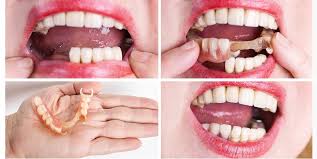
Dentures are removable dental appliances designed to replace missing teeth and restore both the functionality and aesthetics of your smile. They are custom-made to fit your mouth and mimic the appearance of natural teeth, allowing you to eat, speak, and smile with confidence. Dentures are typically made from acrylic, porcelain, or a combination of both, and they are supported by the soft and hard tissues in your mouth.
There are two main types of dentures: full (complete) dentures and partial dentures. The right type for you depends on the number of teeth missing and your overall oral health.
Full dentures are used to replace an entire arch of missing teeth, either on the upper or lower jaw, or both. These dentures rest directly on the gums and are typically recommended when all of the teeth in a jaw are missing or have been removed. Full dentures consist of a full set of prosthetic teeth attached to an acrylic or metal base.
Partial dentures are used when some natural teeth remain in the mouth. They consist of replacement teeth attached to a gum-colored plastic base, which is connected to a metal framework that holds the denture in place. Partial dentures help fill in the gaps left by missing teeth, preventing the surrounding natural teeth from shifting out of position.
Implant-supported dentures are a more stable and long-lasting option. Dental implants are surgically placed into the jawbone to anchor the dentures securely. This option provides superior support and comfort compared to traditional removable dentures, making it easier to eat and speak without worrying about dentures shifting or slipping.
Immediate dentures are temporary dentures placed immediately after teeth are extracted. These dentures allow you to have teeth during the healing process, but they may need to be adjusted or replaced with permanent dentures after your gums have fully healed.
Dentures offer a range of benefits for those with missing teeth:
The process of getting dentures involves several steps to ensure a comfortable and secure fit:
Your dentist will begin with a thorough examination of your mouth, including X-rays or digital impressions to assess the condition of your teeth, gums, and jawbone. Based on this evaluation, your dentist will recommend the most appropriate type of dentures for you.
If full or partial dentures are the right solution, your dentist will take detailed impressions of your gums and any remaining teeth to create custom dentures that fit your mouth precisely.
The impressions are sent to a dental laboratory where the dentures are created. This process can take several weeks, depending on the complexity of the case.
Once your dentures are ready, you’ll return to the dentist for fitting. Your dentist will ensure that the dentures fit comfortably and make any necessary adjustments. Over time, as your gums and bone structure change, further adjustments may be required to maintain a proper fit.
It’s important to visit your dentist regularly after getting dentures to check for fit and comfort. Regular check-ups also help prevent any complications, such as gum irritation or bone loss.
Proper care is essential to maintaining the longevity of your dentures and ensuring optimal oral health. Follow these care tips:
You may be a good candidate for dentures if you:
However, individuals who have significant jawbone deterioration or chronic gum disease may require additional treatment, such as dental implants or bone grafting, to support their dentures.
The cost of dentures can vary depending on the type of denture, materials used, and any additional treatments required. On average:
Most dental insurance plans cover part of the cost of dentures, but it’s essential to check with your provider about coverage details.